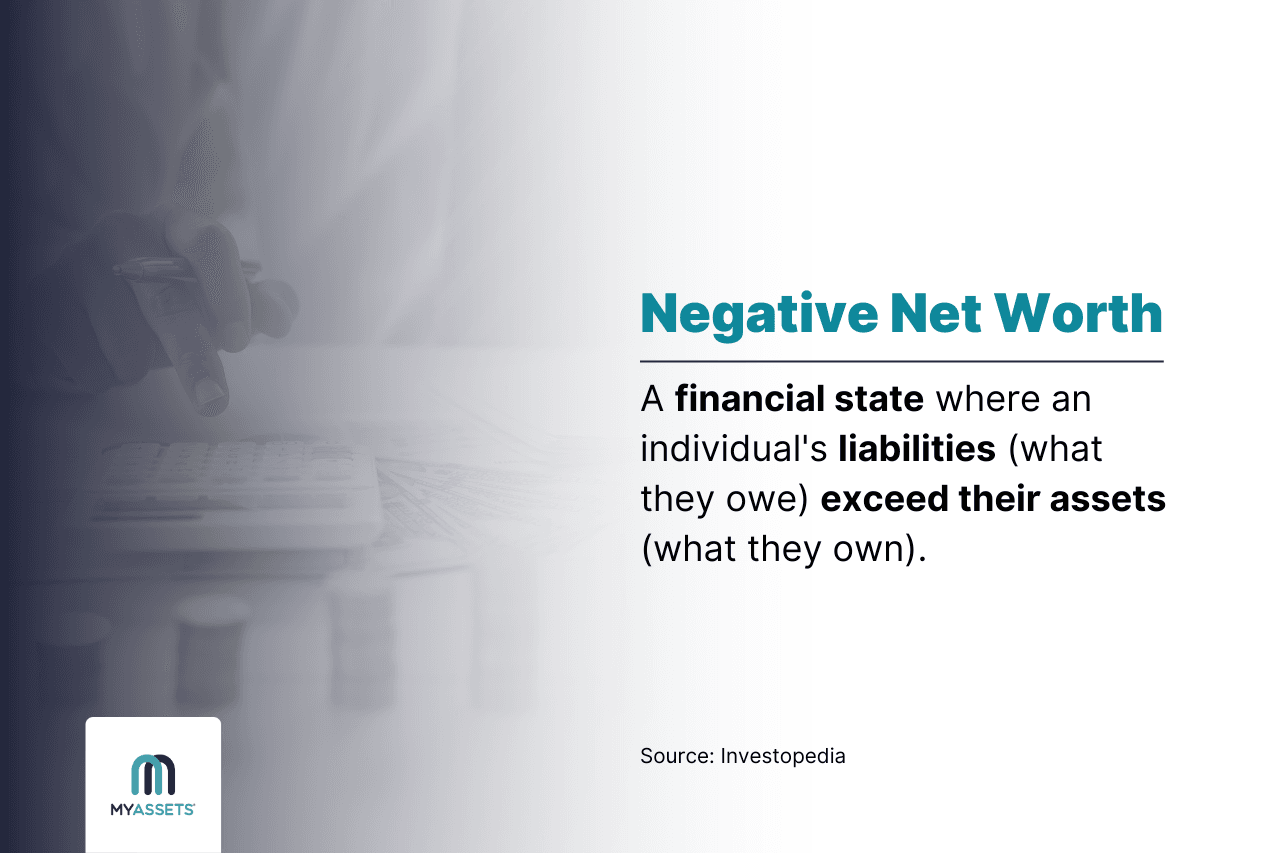Did you know that nearly one-third of 25- to 34-year-olds in Great Britain have negative net worth? Surprisingly, the Fairness Foundation’s No Money, More Problems revealed a significant financial vulnerability among young adults. The issue was evident in Wales, where 47% of this age group had zero or negative wealth, compared to just 18% in London.
The report also highlighted a broader trend of increasing debt, with average net debts across all age groups reaching £8,313 in 2022, a 25% real-terms increase from £5,008 in 2010.
This data presents a concerning picture of financial health among the British public, underscoring the relevance of analysing the drivers behind negative net worth.
While calculating net worth is a start to staying up to date on financial standing, it is the deeper exploration of why liabilities exceed assets that enables individuals to take corrective action and increase their net worth.
To explore this further, the following sections outline the top causes of a deficit net worth and present strategic approaches to avoid them. With this knowledge, individuals gain financial literacy, empowering them to take proactive steps towards personal financial success.
- What is Negative Net Worth?
- Top Causes of a Deficient Net Worth
- How to Avoid Negative Net Worth
- Avoiding Deficit Net Worth: What You Can Do Now
- Liabilities Net Worth: Frequently Asked Questions
What is Negative Net Worth?
An individual’s net worth is measured by deducting liabilities from their total assets. A negative result –known as negative net worth –occurs when the amount a person owes (their liabilities) is greater than the total value of what they own (their assets), as highlighted by Investopedia.
Given its calculation, a pressing question arises: How can a negative net worth affect individuals? Generally, a negative net worth makes it challenging for individuals to obtain financing, as highlighted by the academic institution Esade.
Lenders typically view negative net worth as a red flag. This is especially true when an individual's history of failing to pay credit card debts, mortgages, or other bills points to a higher risk of loan default. As a result, it can impact a person's chances of securing new loans or getting favourable terms.
Understanding Temporary Negative Net Worth
On the other side of the coin, a negative net worth can also be a temporary financial phase, particularly subject to the fluctuations of asset values. For instance, an individual who just took out a mortgage may carry more debt than the value of what they own.
However, as the property gains value over time and continues to reduce the outstanding mortgage balance, its net worth progressively increases, eventually transitioning from a negative to a positive position.
This illustrates that a deficit net worth is not always a permanent state and can often reflect a strategic long-term investment in appreciating assets.
Top Causes of a Deficient Net Worth
While a negative net worth can be a common occurrence at certain points in life, it can also signal financial challenges or poor money management. Below are some contributors to a declining net worth:
1. Poor Personal Finance Management
According to the educational platform Big Talks Weekly, poor personal financial management refers to the careless or ineffective use of fiscal resources.
This leads to the crucial question: What are the warning signs of poor financial management? Below are habits that can increase liabilities in net worth.
- Avoid tracking income and expenses.
- Delays bill payment.
- Disregard financial planning.
- Fails to invest wisely.
- Makes impulse purchases regularly.
- Misses opportunities to build savings and emergency funds.
- Neglects retirement planning.
- Overlooks high-interest debt repayment.
- Overspends beyond means.
- Spends on unnecessary things.
Collectively, these practices often lead to consequences, including rising debt, limited savings, and long-term strain on well-being. Without proper attention, individuals may compromise their financial well-being and struggle to reach their goals.
See Also: 8 Tips For Managing Your Wealth According To Finance Experts
2. High Debt Levels
Accumulating significant debt is a primary contributor to a deficit net worth, as all debt falls under liabilities. Recalling net worth calculation –assets minus liabilities, it becomes clear that if liabilities, like debt, surpass total asset value, then it automatically results in a negative net worth.
Given the impact of debt on net worth, it leads to the question: What are the sources of debt? Listed below are the seven categories of debt identified by Liberty Street Economics in their study:
- Auto Loans
- Credit Card Debt
- Housing Loans (mortgages)
- Legal Bills
- Medical Bills
- Other Personal Loans
- Student Loans
This unmanageable accumulation of liabilities can lead to several consequences, including (1) increased interest rates, (2) limited access to new credit, and (3) the risk of insolvency or bankruptcy in severe cases.
Ultimately, when debt increases continuously without being paid down, it compromises financial standing by decreasing net worth.
3. Declining Asset Value
Asset is another crucial factor affecting net worth, especially when major assets, such as real estate, vehicles, or investments, experience a substantial drop in market value. When this occurs, the total worth of those assets decreases, impacting an individual’s net worth.
To understand the primary reasons why asset value declines and contributes to a negative net worth, here is a breakdown:
a. Market Fluctuations
Market fluctuation refers to the changing values of assets such as stocks, bonds, real estate, and other investments.
When a large portion of assets is concentrated in these risky investments and the market experiences a downturn, the worth of those assets can diminish, leading to massive losses. This impacts net worth, as the current market value of their holdings is reduced.
b. Depreciation of Physical Assets
The value of physical assets, such as cars, electronics, and furniture, naturally declines as they are utilised. This case, known as depreciation, reflects the ongoing drop in the asset’s market value due to physical deterioration, increasing age, and technological or stylistic obsolescence.
This raises an important question: How does depreciation impact net worth? Consider a scenario where someone finances a car with a loan. If the car’s value depreciates more quickly than the loan is being repaid, the individual may end up owing more than the asset is currently worth.
This situation is known as being underwater on the loan, meaning the liability (the car loan) exceeds the asset's value (the car itself), thereby directly reducing one's net worth, as Members Heritage highlights.
Also Read: The Best Household Management Software for Organising Furniture and Assets
How to Avoid Negative Net Worth
A deficit in net worth is a common concern, often caused by poor financial management. This article outlines actionable steps to avoid negative net worth.
1. Manage Personal Finances
Personal finance, as defined by Investopedia, is the management of an individual’s financial activities, such as saving, investing, and spending. It covers a wide range of areas, including the following:
- Banking
- Budgeting
- Estate Management
- Insurance
- Investments
- Loans and Mortgages
- Retirement Planning
- Taxation
To learn how to manage personal finances, here are some ways to get started:
- Calculate Net Worth: Gather all financial statements (bank accounts, savings accounts, credit cards, loans, investments, etc.) to understand what is owned and owed. Apply the formula: Assets — Liabilities to determine net worth.
- Set Financial Goals: Define short-term (i.e. emergency fund, vacation) and long-term (i.e. house down payment, retirement savings) financial goals. Ensure that it is specific, measurable, achievable, relevant and time-bound.
- Create a Budget: Initially, list all income and expenses, then categorise spending to know where money is going. This insight helps one allocate their money and decide which spending to prioritise.
- Monitor and Adjust Plan: An individual’s financial situation changes over time, making regular monitoring and adjustment of budget, net worth, investments, and goals relevant to stay on track.
Fundamentally, managing personal finances empowers individuals to make sound decisions. Whether cutting expenses to pay off debt or saving for retirement, this strategy provides a framework to achieve financial goals.
2. Reduce Liabilities
Generally, liabilities increase in return for the acquisition of assets, in the borrowing of cash or the receipt of unearned revenue, as noted by Libre Texts Business.
In this context, decreasing the amount borrowed is crucial to avoid a deficit in net worth. Explore different ways to reduce personal liabilities:
- Avoid New Debt: Resist taking on new loans or making purchases on credit. Prioritise using cash or debit for transactions, First National Bank of Omaha suggests.
- Consolidate Debt: According to Nerd Wallet, consider options like a personal loan or balance transfer with a lower interest rate to combine multiple debts into one. Doing so can reduce monthly payments and total interest.
- Prioritise Debt Repayment: Focus extra payments on high-interest debts first (i.e. credit cards) using strategies like the debt avalanche (highest interest rate first) or the debt snowball (smallest balance first).
- Reduce Expenses: Minimising non-essential spending—like reducing restaurant visits, removing inactive subscriptions, or finding cost-effective replacements.
The ultimate goal is to reduce overall debt and prevent it from accumulating. By applying these strategies, individuals can effectively lower their liabilities and build their net worth.
3. Increase Personal Assets
Increasing assets is equally relevant as minimising liabilities when aiming for a positive net worth. Investopedia supports this, noting that individuals can enhance their net worth by either accumulating more assets or reducing what they owe.
Recognising its influence on financial health, this article highlights methods to grow personal assets.
- Contribute to Retirement Accounts: Boosting contributions to tax-advantaged accounts, such as 401(k)s, IRAs, or pension plans, can help build retirement assets more effectively, said the Internal Revenue Service.
- Diversify Portfolio: Huntington Bank emphasises spreading investments across different asset classes (i.e. stocks, bonds, real estate) to minimise the impact of poor performance from any single investment.
- Grow Savings: Putting money into a savings account is a way to build cash assets. Experian notes that it also lessens debt increment when faced with emergencies.
- Increase Income Streams: Earning extra income through side jobs, freelancing, or higher-paying jobs adds funds that can boost savings, investments, or debt repayment.
By implementing these strategies, individuals build wealth while creating a stronger financial future. This step, combined with debt management, is how individuals achieve and keep a positive net worth.
Avoiding Deficit Net Worth: What You Can Do Now
Negative net worth is the result of liabilities outweighing assets, indicating a challenging fiscal position. This often stems from poor personal finance management, accumulating high levels of debt, or experiencing a decline in asset value.
The good news? It is entirely avoidable with the right approach. By managing personal finances, reducing liabilities, and building personal assets, individuals can maintain a positive net worth and lay the groundwork for long-term financial stability and growth.
Liabilities Net Worth: Frequently Asked Questions
1. What are examples of liabilities that reduce net worth?
A person’s net worth can be reduced by several types of liabilities, including mortgages, car loans, student loans, medical expenses, and unpaid credit card balances.
2. How do liabilities impact your net worth?
An individual’s net worth reflects the difference between what they own and what they owe. As liabilities grow, they subtract more from total assets, resulting in a lower net worth.
3. Are there tools to help manage and improve net worth?
Net worth tracking apps, such as Empower or MyAssets, allow users to consolidate their financial accounts. These platforms offer a clear overview of assets versus liabilities, helping users monitor their financial standing over time.
MyAssets: The Ultimate Net Worth Monitoring Tool
Staying on top of net worth starts with consistent monitoring, but with assets and liabilities spread across various sources, how do you keep everything in check? A net worth tracking app like MyAssets offers a solution.
MyAssets is a personal net worth calculator that provides a holistic view of an individual’s assets and liabilities. With MyAsets, users can easily monitor financial assets, such as a current account and a savings account, and keep a close eye on their liabilities by adding credit cards, mortgages, and various loan accounts, all in one platform.
Overwhelming information? MyAssets provides easy, digestible graphs and charts, making it simple to visualise financial progress.
Know where you stand and watch your wealth expand. Start your 14-day free trial with MyAssets today.







